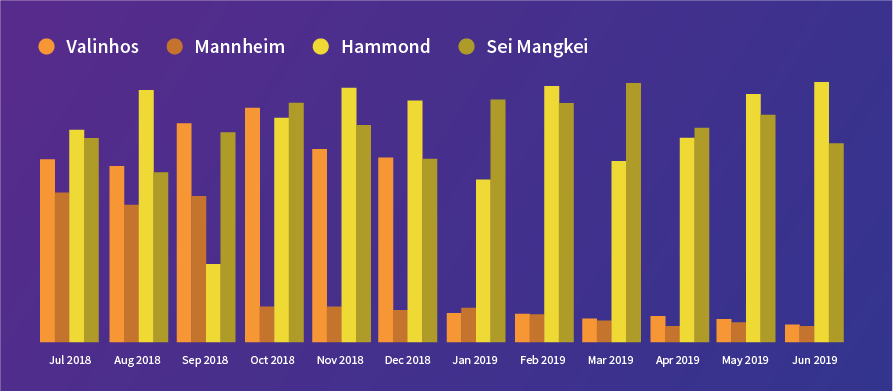2019 marks the fourth consecutive year that the Fifty Five and Five team have attended the Microsoft Inspire conference. And just like every year previously, we’ve had plenty of exciting and insightful conversations about the future of Microsoft technology and digital marketing.
Over the years, the two corenote speeches by Gavriella Schuster (Corporate VP, One Commercial Partner Organization) and Satya Nadella (CEO) have become the bedrock around which the rest of the conference revolves. 2019 was no different. In the first of these, Gavriella Schuster set out the direction the Microsoft Partner Network (MPN) is travelling in and took stock of the successes it would experience over the coming twelve months.
If you missed the speech, don’t worry. We’ve pulled together four main focuses of the corenote in summary right here. Read on to find out more.
1. Focus on: Being a partner
In what has since become a hard-learned lesson in timing, Microsoft announced controversial changes to their internal user rights (IUR) program, just two weeks before this year’s conference kicked off. The program, among other things, guaranteed that members of the Microsoft Partner Network (MNP) had free access to Office 365 licenses for their employees. The changes would have rolled back on these benefits, since the growth of the Partner Network was fast making the costs unsustainable for Microsoft. Or, as Gavriella Schuster herself said: ‘We just can’t afford this’.
In the days before the conference kicked off, however, predictable controversy abounded from partners who weren’t enthusiastic about the heavy costs associated with purchasing these licenses.
With such an overwhelmingly negative response to the changes, Microsoft had no choice but to roll back on the rollback. On Friday 12th, just days before Inspire 2019 kicked off, they announced that they were indefinitely reinstating the IUR benefits. Naturally, the controversy and discussions from the weeks that led up to this formed an important part of Gavriella’s speech. In fact, it was almost the first thing she discussed:
“In my mind there was no choice for us but to walk back on that change. We’re going to keep the IURs just as they are. You have my commitment that I will continue to listen and learn – and though we may stumble, we will learn and grow together.”
Regardless of the controversy and the timing of the decision, this theme of reconciliation and partnership continued through much of the rest of the corenote.
2. Focus on: Microsoft’s transformation
These days, you’ll have to travel quite far in the Microsoft Partner Network before you hear a bad word said about Microsoft CEO Satya Nadella. Since the start of his tenure in 2014, the company’s fortunes have drastically changed – to the point where they overtook Apple to become the world’s most valuable company for a period towards the end of last year. At the start of this decade, the thought would have been unthinkable.
Nobody directly mentioned that particular fact in either of this year’s Inspire corenotes, but it reflects an important theme that did come up: Microsoft’s transformation. Since 2014, Nadella has ushered in a new era, in which the company turned its focus towards its strengths; business IT and software. After a decade of trying to chase the innovations of more fashionable tech companies like Google and Apple, Microsoft decided to go its own way.
Since 2014, Microsoft has almost exclusively turned its attention to cloud-focused products like Office 365 and Azure – updating their popular Office and Windows products for the modern, cloud-based age. Today, Office 365 has more subscribers than Spotify and Amazon Prime combined. In what Bloomberg recently described as a ‘Nadellaissance’, Microsoft’s fortunes have improved year on year since he took the reins.
This news won’t come as much surprise for most Microsoft Partners. But during the corenote, various speakers came back to this theme on many occasions, making it clear that it was only with the help of the vast Partner Network that this spectacular transformation was possible.
This was particularly prevalent during a contribution by Judson Althoff, the Executive Vice President of the Microsoft’s Worldwide Commercial Business. In focusing on just the contracts won by Microsoft over the last two quarters, he demonstrated the success of this transformation. These include:
- Adobe
- Canadian Government
- Coca Cola
- Ford
- Danish Government
- Barclays
- Unilever
The fact that all of these organizations have moved to the Microsoft cloud in the last six months just goes to show the remarkable impact that the company is now having on the wider cloud market.
Althoff explained that there were five important pillars that have allowed Microsoft to experience such clear success over the years:
- Becoming industry focused
- Focusing on technical solutions
- Investing in customer success
- Creating a tangible digital impact
- The success of the One Commercial Partner model (OCP)
The final point was arguably the most vital. With over 95% of Microsoft’s revenues coming through its partners, there’s no question that the MPN is a vital part of Microsoft’s transformation.
3. Focus on: Digital transformation in practice
Unilever was one of the companies that have recently turned to Microsoft technology to power their digital transformation. To demonstrate the success they’d experienced, a significant part of Judson Althoff’s speech was dedicated to exploring this case study in further detail. During this demo, he was joined by Unilever Chief Engineer Dave Penrith to explore the success the company has experienced with Microsoft technology.
As a large consumer goods company, Unilever are responsible for over 400 everyday household brands. In their talk, Althoff and Penrith focused on the production of Dove soap, to prove exactly how technology could deliver real benefits to businesses.
Using IoT and Machine Learning from Microsoft Azure, Unilever created a ‘digital twin’ of the machines in their factory, which collected and analysed data about the performance of these technologies. This is a popular model of leveraging data and analytics, in a way that Microsoft describes as a ‘next generation digital model of a physical environment’. Using analytics, they identified trends that allowed them to improve the productivity of these machines and identify any faults in advance. Through this technology, they’ve boosted productivity by 3%, and saved €2.5 million, with energy and material savings.
As well as this, Penrith and Althoff focused on how Microsoft Teams and PowerBI had allowed them to work towards their target of becoming carbon neutral by 2030. Using data extracted from IoT technology, and routed through PowerBI, they managed to create a database that compared the energy usage of major Unilever factories around the world, over time. That database was then shared universally among all of them in a simple interface using Microsoft Teams.

Sharing information in this way allowed the different factories to easily compare where positive workplace practices were being demonstrated across all their factories. From there, engineers in each factory could be encouraged to share best practices and improve processes right across the board.
But these weren’t the only improvements they made. Unilever managed to largely automate the quality control stage of their soap production process. In a live demo, they showed how they’d trained machine learning algorithms to assess the quality of the products, including perfume quality, colour, texture, shape, and logo stamp quality. In providing us with these case studies, Unilever gave us the opportunity to see the reality of how digital transformation can transform an organisation’s success.
4. Focus on: The Future
Of course, there’s only so much time we can spend congratulating ourselves on the success the MPN has had over the last few years. Inspire is also about setting out a roadmap for the future. On this point, both Judson Althoff and Gavriella Schuster were clear; the future is bright and ambitious – though with clear opportunities and challenges ahead.
To help focus efforts forward over the coming twelve months, Gavriella’s closing statement outlined three main things that Microsoft will focus on over the year ahead. These three themes were:
1. Technical intensity
This is all about raising the level of the conversation Microsoft and their partners have with customers to match the technical intensity of their working lives. ‘Every company is a tech company’, Gavriella said, and the resellers themselves need to raise the bar on the conversations they’re having with people to match the expectations and expertise of the 21st century customer.
2. Customer centricity
Customer centricity involves understanding the needs of the customer. To achieve this, partners need build a trusted network around each and every customer. To achieve this, partners should aim to offer a service that provides, integrates, manages, deports and supports the development of Microsoft technology at every stage of the customer lifecycle.
3. Simplicity
Simplicity involves making it clear to all customers and partners where Microsoft products are heading in the future and honing down on the customer-centric nature of their mindset.
A step forward for the MPN
Controversy about IURs aside, this year’s Inspire event was a useful and motivating look into the state of the Microsoft Partner Network as it moves forward into the future. With inspiring successes over the past year, and plenty to drive more motivation in the future, there’s certainly plenty to keep partners busy for the rest of 2019.
With technology improving each year and customer expectations higher than ever, competition has never been more important within the Partner Network. To continue generating leads, partners are employing ever more complex marketing strategies to stand out from the crowd. In our work compiling this year’s Top 50 Digital Marketing Excellence Report, as well as speaking to partners on stands at this year’s conference, we’ve been lucky to experience this excellence first hand.
If you want to find out more about how to succeed in digital marketing as a Microsoft Partner against this competitive backdrop, get in touch with the team here at Fifty Five and Five to start discussing your strategy.

